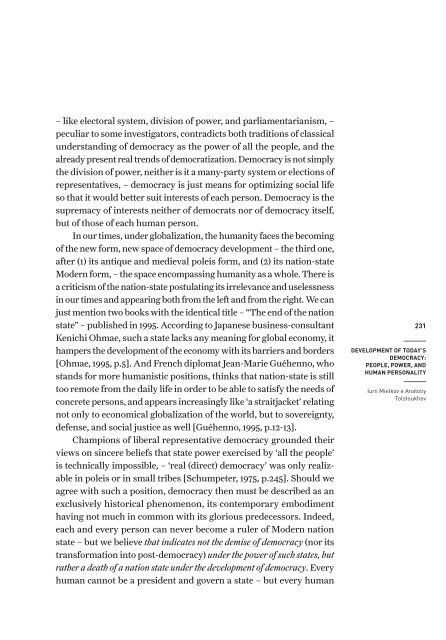Democracy Today.indb - Universidade do Minho
Democracy Today.indb - Universidade do Minho
Democracy Today.indb - Universidade do Minho
You also want an ePaper? Increase the reach of your titles
YUMPU automatically turns print PDFs into web optimized ePapers that Google loves.
– like electoral system, division of power, and parliamentarianism, –<br />
peculiar to some investigators, contradicts both traditions of classical<br />
understanding of democracy as the power of all the people, and the<br />
already present real trends of democratization. <strong>Democracy</strong> is not simply<br />
the division of power, neither is it a many-party system or elections of<br />
representatives, – democracy is just means for optimizing social life<br />
so that it would better suit interests of each person. <strong>Democracy</strong> is the<br />
supremacy of interests neither of democrats nor of democracy itself,<br />
but of those of each human person.<br />
In our times, under globalization, the humanity faces the becoming<br />
of the new form, new space of democracy development – the third one,<br />
after (1) its antique and medieval poleis form, and (2) its nation-state<br />
Modern form, – the space encompassing humanity as a whole. There is<br />
a criticism of the nation-state postulating its irrelevance and uselessness<br />
in our times and appearing both from the left and from the right. We can<br />
just mention two books with the identical title – “The end of the nation<br />
state” – published in 1995. According to Japanese business-consultant<br />
Kenichi Ohmae, such a state lacks any meaning for global economy, it<br />
hampers the development of the economy with its barriers and borders<br />
[Ohmae, 1995, p.5]. And French diplomat Jean-Marie Guéhenno, who<br />
stands for more humanistic positions, thinks that nation-state is still<br />
too remote from the daily life in order to be able to satisfy the needs of<br />
concrete persons, and appears increasingly like ‘a straitjacket’ relating<br />
not only to economical globalization of the world, but to sovereignty,<br />
defense, and social justice as well [Guéhenno, 1995, p.12-13].<br />
Champions of liberal representative democracy grounded their<br />
views on sincere beliefs that state power exercised by ‘all the people’<br />
is technically impossible, – ‘real (direct) democracy’ was only realizable<br />
in poleis or in small tribes [Schumpeter, 1975, p.245]. Should we<br />
agree with such a position, democracy then must be described as an<br />
exclusively historical phenomenon, its contemporary embodiment<br />
having not much in common with its glorious predecessors. Indeed,<br />
each and every person can never become a ruler of Modern nation<br />
state – but we believe that indicates not the demise of democracy (nor its<br />
transformation into post-democracy) under the power of such states, but<br />
rather a death of a nation state under the development of democracy. Every<br />
human cannot be a president and govern a state – but every human<br />
231<br />
DEVELOPMENT OF TODAY’S<br />
DEMOCRACY:<br />
PEOPLE, POWER, AND<br />
HUMAN PERSONALITY<br />
Iurii Mielkov e Anatoliy<br />
Tolstoukhov
















